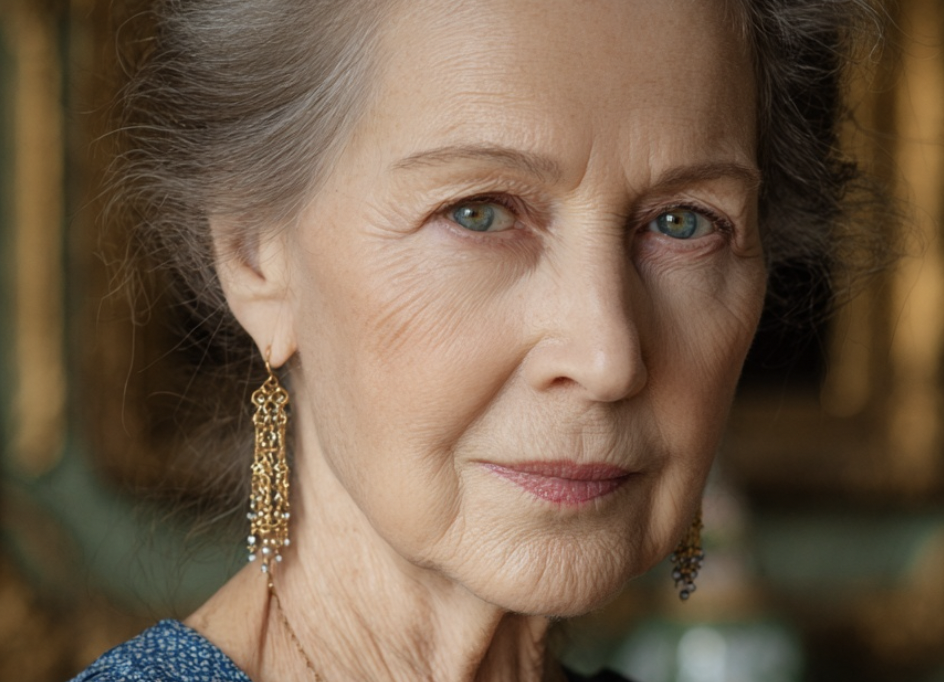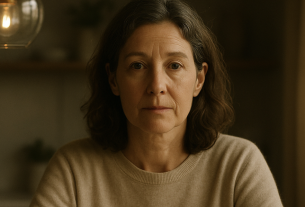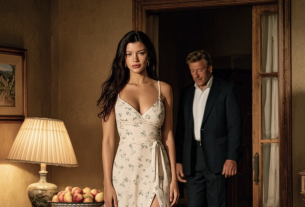“You bought the wrong bread again,” my daughter-in-law Katya’s voice grated on my ears as I was unpacking the bags in the kitchen. “I asked for yeast-free. I’ve asked you five times.”
She deliberately took the loaf I brought and spun it in her hands as if it were some exotic and poisonous caterpillar.
“Katya, I forgot, I’m sorry. I got distracted.”
“You’re always ‘distracted,’ Anna Petrovna. And we have to eat this. Artyom might get an allergy.”
She tossed the loaf onto the counter as if she were doing me a huge favor by not throwing it straight into the trash.
I swallowed the lump rising in my throat. My grandson Artyom is six, and he’s never had an allergy to regular bread in his life.
My son poked his head into the room.
“Mom, have you seen my blue sweater?”
“Yes, Olezhek. It’s in the wash, I—”
“Why?” He didn’t even let me finish. “I was going to wear it today! Come on, Mom!”
He disappeared, leaving me alone with that irritated “come on, Mom,” which lately felt worse than a slap in the face. I washed his sweater. I took care of it. And once again, I was at fault.
I slowly went to my room, passing through the living room where Katya was already loudly telling her friend on the phone that “my mother-in-law is at it again.” The laughter from the phone was just as sharp as her words.
My room felt like the only safe place in this big house that once was cozy. Now it buzzed like a beehive.
Constant chatter, kids shrieking, the TV on, doors slamming. Noisy. Crowded. And unbearably lonely.
I sat down on the edge of my bed. All my life, I’d been afraid of ending up alone. Afraid that the kids would grow up and leave, and I’d be sitting in empty rooms. What a fool I was.
Only at fifty-five did I realize that the scariest thing isn’t an empty apartment, but a full house where no one needs you.
You’re just a free add-on for them. A walking utility that’s always malfunctioning. Bring this, fetch that, do the laundry—but only the way we say. One wrong move, and you’re in the way, annoying, underfoot.
That evening I tried again. My son was sitting at his laptop, frowning.
“Oleg, can we talk?”
“Mom, I’m working, can’t you see?” He didn’t take his eyes off the screen.
“I just wanted—”
“Can it wait?”
‘Later’ never came. Katya and he had their own life, their own plans, their own conversations. And I was… just background noise. Like an old couch or a worn-out lamp. There, but not really.
There was a knock on the door. It was Artyom.
“Grandma, read to me,” he handed me a book.
For a moment, my heart leapt with joy. Here he was, my little ray of sunshine. The only one who—
“Artyom!” Katya appeared in the doorway. “How many times do I have to tell you not to bother Grandma? Go, it’s time for your tablet.”
She took the book from him and led him away by the hand.
And I sat there, staring at the closed door. And at that moment, I realized I couldn’t just be background anymore. Something had to change. Or I’d just disappear into the walls of this house like a ghost.
The decision didn’t come immediately. It ripened in me for several days, while I mechanically washed dishes, went shopping, and silently endured all the little pricks.
It solidified when I found almost a full pot of my pilaf in the trash—“too greasy, we’re on a diet.”
I decided to start small. With my own space.
On Saturday morning, while everyone was still asleep, I took out boxes of my late husband’s things from the attic.
His books, tools, old photos. I started sorting them right there in the living room, on the big table. I wanted to make a little memorial corner, to hang his portrait.
Katya was the first to come downstairs. She froze in the doorway as if she’d seen cockroaches.
“What is all this?”
“Good morning, Katya. I’m sorting things.”
“I see. Can’t you do that in your own room? You’ve cluttered up the whole living room. We have guests coming today, by the way.”
“It’s my living room too,” I said quietly but firmly, surprised by my own tone. “And these are your father-in-law’s things. Oleg’s father.”
Katya snorted and marched off to the kitchen, clattering the kettle loudly. Ten minutes later, Oleg showed up, drawn by the smell of coffee and my little rebellion.
“Mom, what are you doing? Katya says you’ve filled the place up.”
“I just wanted to hang your father’s portrait. Over here,” I pointed to the wall.
“Here?” he looked at the wall, then at me. “Are you crazy? We have a modern design here. Katya’s picked out a fancy mirror for that spot.”
So that’s how it was. A mirror. Trendy. More important than his father’s memory.
“Oleg, this is my house.”
“Oh, here we go,” he rolled his eyes. “Always with your ‘my house.’ We live here too! We renovated!”
The ‘renovation’ was the wall in the kitchen they painted a garish lime green. That was it.
“That’s why I want the house to stay a home, not some soulless place with trendy mirrors.”
That evening came the main conversation. They approached me together, faces carefully serious, and sat across from me.
“Mom, we’ve been thinking,” Oleg began softly, “this house is too big for all of us. Utilities are expensive, cleaning is hard…”
Katya continued, looking at me with innocent eyes:
“Yes, Anna Petrovna. We care about you. It will be too hard for you when we decide to move out.”
A chill ran down my spine.
“Where are you going?”
“We want to sell the house,” Oleg blurted. “Buy a nice new apartment for ourselves. And for you. A cozy one-bedroom. Your own place, but small.”
I looked from my son to my daughter-in-law. They weren’t joking. They’d already decided everything. In their minds, they’d already divided the money from selling my house. My fortress. My life.
“Sell… my house?”
“Why do you say ‘your’ house?” Katya said with a brazen smile. “We live here too, we’ve invested. Or do you want us to slave away our whole lives maintaining this mansion for you?”
I stood up. My legs were shaky, but I straightened.
“No.”
“What do you mean, ‘no’?” Oleg didn’t understand. “Mom, this is for everyone’s good.”
“I said no. This house is not for sale. Never.”
I looked my son straight in the eyes. There was nothing there but annoyance and cold calculation. The mask of a loving family had finally slipped away. I wasn’t just in the way.
I was an obstacle to their ‘bright future.’ And they were ready to bulldoze that obstacle. At any cost.
My “no” hung in the air. Oleg turned crimson. Katya, on the other hand, went pale, her thin lips pressed into a line.
“You don’t understand,” my son hissed. “This isn’t a request. We already found a realtor.”
“Cancel the realtor,” I replied calmly. It wasn’t easy to sound calm; I was shaking inside, but I knew if I showed weakness now, they’d eat me alive.
“You’re going to live in your one-bedroom and be happy about it!” Katya shrieked. “Stop ruining our lives with your craziness!”
“Katya,” Oleg tried to quiet her, then turned to me. “Mom, how can you do this to us? To your own son? I’m trying for the family! For your grandson!”
A dirty trick. But it didn’t work anymore.
“My grandson will come visit this house. His grandmother’s house. Not a faceless new building bought at the expense of his grandfather’s memory.”
“Oh, so that’s how it is!” Katya jumped up. “So we mean nothing to you? We lived here, helped you, and now you’re kicking us out?”
I looked at her. And for the first time in a long while, I saw not a frightened shadow, but the mistress of my own home.
“You said it yourself, Katya. Not me.”
The next few days were hell. They stopped talking to me. Not just ignoring me—they created a vacuum around me. Silence at the table. Doors slammed in my face. Food cooked just for the two of them. They were trying to force me out.
But they miscalculated. I was no longer afraid of emptiness. I craved it.
On Friday, I made my move. In the evening, while they were sitting in the living room watching some show, I walked in and laid two plane tickets on the table.
Oleg looked up at me in surprise.
“What’s this?”
“Tickets. For you. To your hometown. For next Saturday.”
Katya snatched up the tickets. Her eyes widened.
“You… you’re kicking us out?”
“I’m giving you the chance to start your own, separate life. The one you always dreamed of. Without me, without this old house. I’ll even help you with money for the first months of rent.”
“You… you have no right!” Oleg shouted, jumping up. “This is my house too! I’m registered here!”
“Yes, registered,” I nodded. “But I’m the owner. And I’m tired. I want to live for myself. In peace.”
He looked at me, and I could see his world falling apart. A world where mom was always there, always convenient, always to blame.
“You’ll regret this,” he choked out. “You’ll end up all alone.”
“I’ve already been alone. In a house full of people. I don’t want that anymore.”
They left a week later. Packed in silence, glaring at me with anger. Artyom cried—he didn’t understand why they were leaving grandma.
I hugged him, kissed him, and promised to visit soon. And that he could visit me too. Maybe.
When the door slammed shut behind the last bag, I slowly walked around the house. It seemed huge, echoing. I went to the wall where Katya wanted to hang her mirror. I took a hammer, a nail, and my husband’s portrait in its heavy wooden frame.
A few precise strikes. The portrait hung in its place. My husband smiled at me from the photo—young, happy.
I ran my hand over the frame. The house went still, the sounds from outside faded away.
There was no sense of triumph, no overwhelming joy. There was something else. A sense of rightness. As if I’d finally set things in order not just in my home, but in my soul.
Yes, now the house was empty. But it was no longer alien. It was mine again. And that wasn’t scary. It was a beginning.
The first month felt like a honeymoon. I woke up whenever I wanted, not to the crash of dishes in the kitchen.
I drank coffee on the veranda, wrapped in a blanket, and read books that had gathered dust on the shelves for years. I rearranged the living room furniture the way I’d always dreamed. The house breathed with me.
I realized that loneliness and solitude are not the same. I wasn’t lonely. I was alone with myself. And I liked it.
At the end of the second month, the phone rang. Oleg’s number. My heart gave its old jolt, but I answered calmly.
“Mom?” my son’s voice was tight, desperate. “Mom, something terrible’s happened.”
I sat down on a chair.
“What is it, Oleg?”
“Katya… she’s in the hospital. It’s very serious. We need money for surgery. A huge amount. I don’t have that kind of money.”
He sobbed. I’d never heard my son cry. Not even as a child.
“How much do you need?” I asked, my voice sounding strange and wooden.
He named the amount. It was astronomical. Almost equal to the price of the one-bedroom apartment they’d once wished on me.
“Mom, I’m begging you. Sell the house. It’s the only way. We’ll pay you back, I swear. Save Katya, save our family.”
I was silent. My mind was blank. On one hand, my sick daughter-in-law, the mother of my grandson. On the other, the lie I could feel with every fiber of my being.
“I’ll think about it,” I said, and hung up.
All day, I wandered around the house in a daze. I looked at my husband’s portrait, my flowers, the armchair where I loved to read. And I understood this was a test. The final one.
That evening, I called my old friend in their city. Just to chat. About the weather, about health. And then, as if by chance, I asked if she’d heard anything about Katya.
“Oh, Katya?” my friend replied cheerfully. “She’s fine. I saw her yesterday at the mall. She was picking out a fur coat. Said they’re moving into a new apartment soon, so she’s updating her wardrobe.”
The world didn’t turn upside down. It just clicked into place. Every piece of the puzzle fell into a painfully clear, ugly picture.
I poured myself a glass of wine. Sat in my favorite armchair. And when the phone rang again, I answered right away.
“So, Mom? Have you decided?” Oleg’s voice trembled with impatience.
“I have, son.”
“And? Are you selling?”
“No.”
There was confused silence on the other end.
“What do you mean, no? Do you want Katya to suffer?”
“Tell Katya that the mink coat suits her very well. Especially for a hospital bed,” I said, and smiled.
And also tell her there will be no money. Ever. And not to call here anymore. This number will soon be gone.
I hung up before he could say anything else.
I finished my wine, looking out at the darkening garden. I didn’t feel like a victor.
I felt like a surgeon who had just amputated a hopelessly diseased part of my life. It hurt. But it was pain that leads to healing.
Now I knew for sure: the scariest thing isn’t an empty apartment. The scariest thing is when you’re ready to give up everything for people who are ready to take the last thing you have. And the most important thing is to realize this in time.



